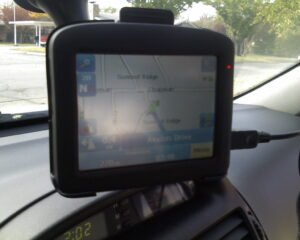We were a half-hour drive from our destination and already thinking of the cool lake we were going to jump into and the scrumptious lunch we had packed when suddenly, my husband Miky accelerated and the connection between the gas pedal and the engine was gone. Just gone. There was nothing there. He pumped the gas pedal, but to no avail.
Were we out of gas? No. He went through the gears—we had no gears. Our beloved 1991 VW Westfalia pop-up van sputtered forward in first gear for a few feet more, then in the middle of a long hill, with no civilization or shade in sight, she stopped. Dead.
That morning, Miky and I had spontaneously escaped the ninety-plus temperatures they were promising at home in High Falls, N.Y., packed and headed north to Glimmerglass State Park near Cooperstown, NY, one of our favorite places to camp.
The GPS had just re-routed us around the city of Oneonta

Miky and I had a moment of panic. We loved our camper van. We had named her “Baboulya,” an endearing name for Babushka, grandmother in Russian. She was an old lady and we loved her. And now she appeared to have died.
Not another new transmission! Three years ago, we had sunk so much money into Baboulya, giving her a heart transplant in the form of a new 2012 Subaru engine, then, a year later, she needed a new transmission. But the pleasure we derived from traveling and camping with Baboulya for the past six years was worth all the expense.
“Check the transmission fluid,” I said. Miky and I jumped out of the van, threw our camping equipment on the seats and opened up the engine. Sure enough the transmission fluid looked low. Was this the problem?
Even if we had identified the problem, we were still in trouble. We were in the middle of nowhere; we had no transmission fluid with us, nor did we have a funnel to pour in the fluid. The temperature was 90° and climbing.
I had called AAA, but the GPS could not identify our location and could not find us. We needed a physical address. Very few cars went by as I tried to wave down drivers in hopes of at least learning the name of the route and some kind of landmark.
At last, a nondescript grey van stopped. We rushed to the vehicle for help. An obese middle-aged woman was driving, wedged behind the wheel. A young man sat in the passenger’s seat and in the back seat, a young woman I assumed to be his wife was sitting between their two small children. The kids were young, maybe four and five, sucking pacifiers as they played video games on their separate screens.
As a group, they were not prepossessing, and the impression worsened when the young man hopped out and began to speak non-stop to us. His gaunt, unshaven face had the unfortunate look of a mug shot.
We were in the middle of nowhere. My uneasiness rose with the temperature.
“My wife has epilepsy and is on all sorts of drugs,” the young man said as he and then the very young woman stepped towards us and our broken-down camper. I knew his name was Chris because it was written on his baseball cap, which he wore backwards. I read the name as he turned toward his wife.
“Her alcoholic mother did it to her. Crystal, my wife here, had epilepsy as a child and the mother put her on disability to get the money . . .”
“Now all I want to do is work and nobody will give me job,” Crystal said.
“I’m so sorry,” I said.
“We’re just coming back from the doctor’s office in Oneonta, my sister drove us. . . . She’s low on gas, we wasted $30 to go there . . .” Chris continued. “The damned doctor won’t give me any more Xanax—he thinks I’m a drug addict.”
“He’s not a drug addict,” the wife piped up. “He’s just young and they don’t want to give him any more drugs.” His sister added, “Nobody cares anymore . . .”
“What do you need the Xanax for?” I asked Chris.
“I have anxieties,” he answered. “I can’t work although I’m a pretty good mechanic. Xanax calms me down.”
“He also gets paranoid a lot if he doesn’t get his meds,” Crystal added.
“Yeah,” Chris said. “They all really hate me.”
Paranoid. How paranoid? Killer paranoid?
It was hot, now almost 100° and the four of us huddled together in the small shaded area of our camper.
Chris looked into our engine.
“Yes, you need some transmission fluid,” Chris said. “I think you will be good to go once you put some in.” My heart skipped a beat—could it be that easy?
Miky got into their car with Chris’s sister, now identified as Flora, and she drove off with my husband and the children to Oneonta in search of a place where they could pick up five cans of transmission fluid and a funnel for filling. I was left with Chris and Crystal with their drug problems, their poverty, their lack of work, their health problems and potentially dangerous family dynamics. For a brief moment, I thought that this young couple would hit me over the head, grab my pocketbook and run to buy the drugs they needed, but where would they run to?
In between our conversation about their sad situation, Chris kept assuring me that all would be well once the transmission fluid was in. I believed him.
An hour later, I was relieved when sister Flora returned with Miky, the transmission fluid and the funnel. I held my breath as Chris filled the transmission with this God-given greasy fluid.
Please work, I prayed.
“OK, start it up and see if the van will go forward,” Chris said. Miky started her up, put the camper van in first gear and Baboulya inched forward. Then a bit more pressure on the pedal, then down to second gear, then, at last, drive. She was moving. It was a miracle. Miky turned Baboulya around and came down the hill and stopped where the road was flat. We poured in more fluid, filling it to the brim. Baboulya was fixed.
I was close to tears as Miky and I rummaged through our bags to find as much cash as we could to give to the family. We came up with $80. We wished we had more. As I handed Flora a $20 bill for the gas, she clearly looked embarrassed as she mumbled something about peeing in her pants. I smelled the odor of urine, wafting from the seats. She explained that while waiting for Miky in Walgreen’s parking lot with the children, she was not able to get to a toilet on time.

As we slowly drove off, still waving and thanking them profusely, I noticed Chris standing in front of his sister with a towel, hiding her obese body from possible onlookers as she was changing her wet over-sized nylon underwear for something dryer. The children continued sucking on their pacifiers and playing their games.
They didn’t look it, but angels they were . . .
At home, when we took Baboulya to get serviced and to make sure we had no major leak in the transmission, I decided to bring a zinnia bouquet to the secretary who is always so good in getting our camper serviced. When she saw the bouquet of zinnias, she burst into tears. Today was the anniversary of her dear father passing and his favorite flowers were zinnias.
Angels . . .

Share this post with your friends.


This is so touching! Thank you for this fragment of humanity that we all need.
E.H. Jacobs
Thank you E.H Jacobs for your comment. I guess that’s why I write – to underline the humanity that we all need.